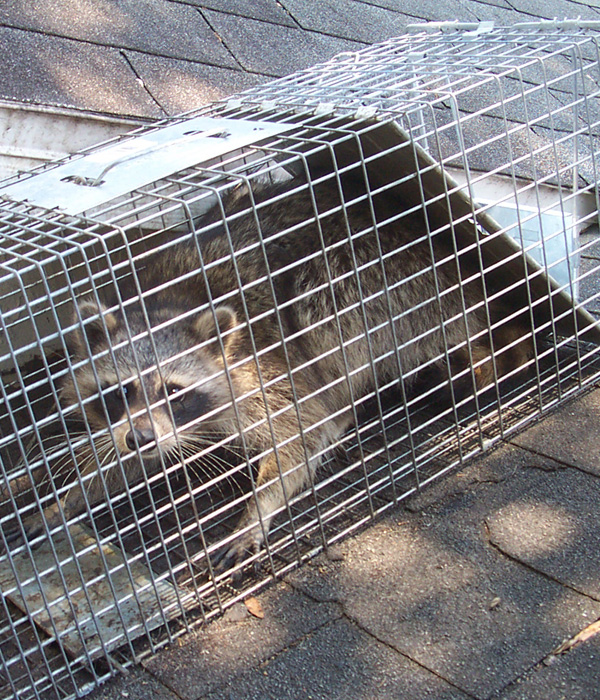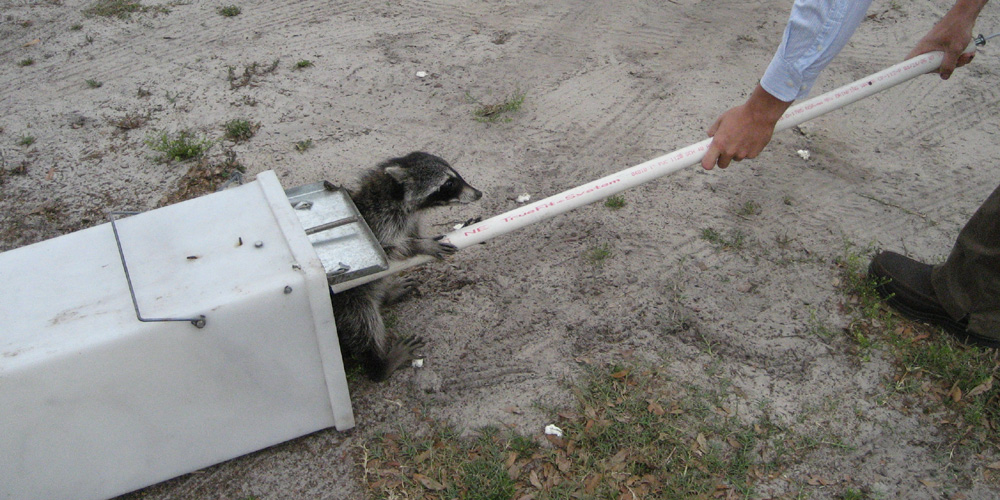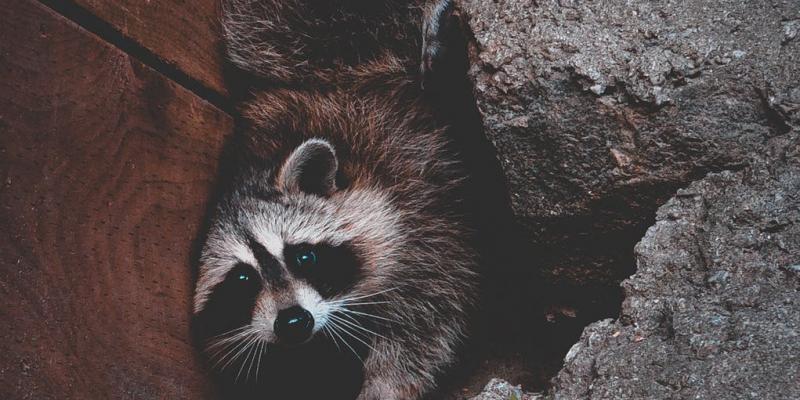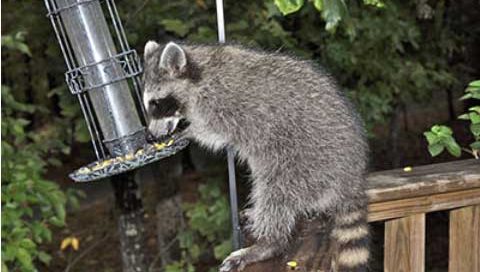HOW TO GET RID OF RACCOONS
Here are eight ways to get rid of raccoons:
1. If the raccoons are inside a house or attic, the most important thing is to find and seal shut their entry hole(s). Be aware that a raccoon in an attic is almost always a female with young.
2. If the raccoons are outside, the first step is to eliminate whatever is attracting them to the property. Strap down garbage can lids, bring in pet food, put steel mesh over the goldfish pond, etc.
3. In either case, trapping and removal might be necessary. Use a large 12x12x32 steel cage trap, and bait with marshmallows. Relocate trapped raccoons at least 10 miles away. Trapping alone rarely solves the problem, and local laws probably apply.
4. Only after the baby raccoons and mother are removed from an attic should you seal the entry holes shut.
5. If raccoons are stuck down a wall in a house, you might need to cut a hole in the drywall.
6. Raccoons in a chimney might respond to certain types of repellents, like male raccoon eviction fluid. Be sure to install a steel cap on the flu afterward.
7. If raccoons are pooping in the swimming pool, install boards with upward-facing nails on the steps.
8. Remember, repellent products and devices like noise or light machines do not affect raccoons in any way.
How To Get Rid Of Raccoons Under Your Deck
If you have a raccoon under your deck, you will hear scratching and other noises coming from under deck during the night. Because they are busy during the night, raccoons will come in and out of their hiding places. If they have babies to feed, there will be lots of noise and lots of traffic. You want them out of there. How do you go about it? There are no really effective ways to get rid of raccoons. Old wives tales of mothballs and such are really just that: Old wives tales. Mothballs will not get rid of your raccoons. If the raccoon mom has babies, she may be aggressive if she feels her young are threatened. One thing you can do is to make living under your deck unattractive for them. Making lots of noise on your deck with pots and pans or bells may chase the raccoons away for a while. It may chase your neighbors away as well. You can wait until the babies are old enough to be on their own and then close off any openings with chicken wire, but that will take a few months. In many cases live trapping and removal is the best way to take care of the animal.
How To Get Rid Of Raccoons In Your Garbage
Raccoons are always on the search for food. If they can get into your garbage cans, they will think it’s a smorgasbord. You will not easily persuade them to leave. The only way not to have raccoons in your trashcan is to secure your trashcan lids so that raccoons can’t get into the cans. Once they are already in there, they may get stuck and you’ll have to find something to help them crawl out. If they are getting into the rubbish the best answer is to make that impossible. Since raccoons are nocturnal animals, you won’t see them much during the day. If you have one trapped in your trash can by chance, be sure to tighten the lid so it can’t come out and harm you. Take the entire trashcan, lid fastened securely, far out into the country. Let the raccoon escape from the trashcan there. Pick up any debris that fell out, take your garbage can and drive back home. When you take your garbage can back to its proper place, close the lid tightly. Employ the use of bungee-cords if you must, to ensure that the raccoons cannot open the lid. Also make sure there are no spills when you place your trash into the can. That would be an attractant. The biggest idea is to be tidy so they don’t come around anymore.
How To Get Rid Of Raccoons In Your Garage
People are in the habit of leaving their garage doors open during the day, especially when they are outside working in the yard. When people finally get around to closing the garage doors, a raccoon may already be in there, hunting for anything edible. The homeowner may not notice the raccoon for some time. He will know of the raccoon’s presence when he wakes up in the middle of the night because of noise. Something is knocking over things in the garage. He may see the raccoon frantically trying to get out. The simplest thing is to open the garage doors with the push of a button and let the raccoon escape. The animal may be so scared, however, that it hides behind or under some vehicles. You can’t see it and you’re afraid to have it attack you. It may wedge itself into some spot where it is stuck. You don’t want to start your car in the morning, and find out there is a raccoon under your hood. In any event, if you can leave the garage open overnight it will usually leave. If it seems to have made itself home in your garage then you’ll need to rent a live trap. Be very careful when removing them as they get quit aggressive.
How To Get Rid Of Raccoons In Your Attic
Raccoons are cute animals. They are comical to watch as they hunt for their food at night. They are not cute when you learn that they have made their home in your attic. Not only will they make a racket at night when you are trying to sleep. They will stink up your home with their urine and feces and make a mess in your attic, in general. There are health concerns to consider as well, such as raccoons can transmit rabies. Be wary of a raccoon behaving either very aggressively or very sluggishly! Home owners have tried to get rid of the raccoons themselves. Most repellents don’t prove useful when it comes to eradicating raccoons from your house. They are stubborn creatures and do not want to leave once they have found a nice home. The only effective way to get a raccoon out of your attic is to set up a trap and remove them this way. When removing the animal make sure to carefully select an area that is safe to set them free. You’ll need to make sure there aren’t any regulations in your area. By trying to trap the raccoons yourself, you run the risk of getting bitten or coming up empty handed, so do be cautious.

Some Tips and Tricks to Hunt Raccoons Effectively
The raccoon is one of the animals that can be found in North America that people are familiar with. A lot of people think that this animal is cute but it also cannot be denied that this animal can be very troublesome
Some people think that they are cute until they have a run-in with the raccoon. Suddenly, they do not think that the raccoon is a cute animal anymore. What you need to remember about the raccoon is this: they are known to be survivors so hunting them down may not be as easy as you have initially thought.
Day and Night Hunting – A Few Tips to Know
There are some people who prefer hunting the raccoon during daytime because they have enough light to see the raccoon. Yet, people also know that they can be seen at night too. You just have to decide when you will be more comfortable hunting them down. Some people hunt for raccoons as a game. This explains why they would love to hunt at night because they feel that this is going to be more challenging. At the same time, they can make use of their hunting tools
Get to know where raccoons can be found. Can you imagine if you would try ro earch for a raccoon but it is not available in the area where you are searching? It will only be a big waste of time. Most raccoons will look for a place wherein they know that they can constantly get food. The more food that is available for them, the more that they will keep coming back. You can leave food for them and eventually trap them if you please.
Do not underestimate a raccoon. This is one of the mistakes that people make. They assume that they will always be one step smarter than the raccoon. This may be true but raccoons are also very smart. They will have the ability to kill different birds when they are hungry. They also know how to enter homes without you realizing it

Problems With Raccoons
Raccoons can be fighters. They come equipped with sharp teeth and claws and they are strong enough to inflict significant harm to a human if they have reason to do so. There are numerous accounts of children and adults who have been disfigured by raccoon attacks. And they are known to inflict wounds on dogs and cats as well. Like all wild animals, raccoons will be more likely to attack if they are cornered, threatened, or protecting young.
Raccoons can transmit rabies. Next to bats, raccoons are most frequently linked to reported cases of rabies in the U.S. If a raccoon is rabid, it will be much more likely to come up close, rather than keep a safe distance.
Raccoons can transmit other diseases. The CDC lists the following diseases that can be spread by wildlife: roundworm, brucellosis, giardiasis, hantavirus pulmonary syndrome, herpesvirus simiae, histoplasmosis, tuberculosis, rabies, and tularemia.
Some Issues You May Know About But Ignore
Raccoons love to get into the garbage. These animals are famous for being able to open things with their human-like hands. At every chance, they will open garbage cans and strew trash around, and other animals are more than happy to help make that mess worse. Going through trash cans and dumpsters makes it likely that a raccoon will pick up harmful bacteria. This is just one more reason to not touch a raccoon, no matter how friendly it is.
Is It A Good Idea To Try To Remove A Raccoon On Your Own?
While these creatures may act and look docile, as described above, they can be very dangerous. It is best to leave wildlife removal to the professionals. Here at Big Blue Bug Solutions, we have the knowledge, tools, and years of experience to safely and humanely remove wildlife.

Effective Raccoon Removal
Raccoon Removal: Getting to Know Raccoons
Raccoons are known to be very intelligent and fearless animals. However due to their stubborn behavior and nocturnal nature they are considered as pests by humans. Raccoons can damage your gardens and they can even make a big mess in search of food. Removing raccoons can be a dangerous business. A company that offers effective raccoon removal services can also provide crawlspace cleanup services for any damages that occurred to your home.
Raccoon Behavior
Raccoons are mischievous by nature and they will go to any length in search of food. The favorite places of raccoons are hollow trees and logs of trees near the lakes and rivers. As these animals are fearless they do not hesitate to enter the area of humans in search of food and shelter. These animals can also use the existing structure of your house to make a den for themselves.
Raccoon Eating Habits
Raccoons are omnivores, which means that they both plants and animals. They eat seeds, nuts, grains and fruits. They also eat animals such as fish, frogs, snails, mice, snakes. Raccoons also like to eat stuff out of the garbage cans and if you happen to leave pet food out, they will eat it.
Removing Raccoons from your Place
If you want to remove raccoons you need to apply effective raccoon control methods without losing any time. You should not be careless in dealing with these animals as once they enter your home they can be a big nuisance for you. Here we will discuss some of the most effective raccoon removal methods.
Remove Water and Food
Raccoons can enter your home in search of food and for that you need to be very careful. You should not leave any type of food which might attract these animals. Ideally you should remove trash and protect the garbage bins. You should always try to clean the fruits, nuts and bird seeds that have fallen in your yard. If you see that there is any leftover food and drink you should clean it as well.

Tips On How To Avoid Conflicts With Raccoons
Raccoons Procyon lotor are found throughout the United States, but are not native to Utah. They live in forests, marshes, near lakes and rivers and even in urban areas. Raccoons are gray in color, with bushy, black, ringed tails and black masks across their faces. Tracks are about 4 ½ inches long. The hind print is longer that the front print and five toes can be clearly visible in the tracks of both feet. Adults may weigh 10-30 pounds. Vocalizations include high-pitched squeals and chatter. Their scientific name means “washer” because they sometimes dunk their food in water before eating it.
SHARE THE WILD
Human/raccoon conflicts can occur in urban areas throughout the state. Raccoons will prey on poultry, small pets and get into trash and gardens. They have also been known to nest in attics, chimneys, basements and garages. They can enter through holes already present in a structure, or they can dig and rip an opening. Raccoons in a home can sometimes be heard scurrying about, whining or growling. Raccoons can pose a risk to humans and pets with some of the diseases they carry, such as distemper, mange, rabies, and canine and feline parovirus and roundworm.
Avoid Conflicts
Raccoons have been known to inhabit chimneys, attics, basements and garages. They can enter through holes already present or create their own entry hole.
Determining that raccoons are responsible for the damage is the first step; removing attractants and exclusion are the next steps in avoiding conflicts. Involving neighbors in these efforts is the
Exclusion And Deterants
Install chimney caps to prevent raccoons from nesting. Fall is the best time to install the caps, since the raccoons are not raising young. If you discover raccoons have moved into your uncovered chimney, it is best to wait for them to move out on their own. After eight to ten weeks the mother and young will leave and not return